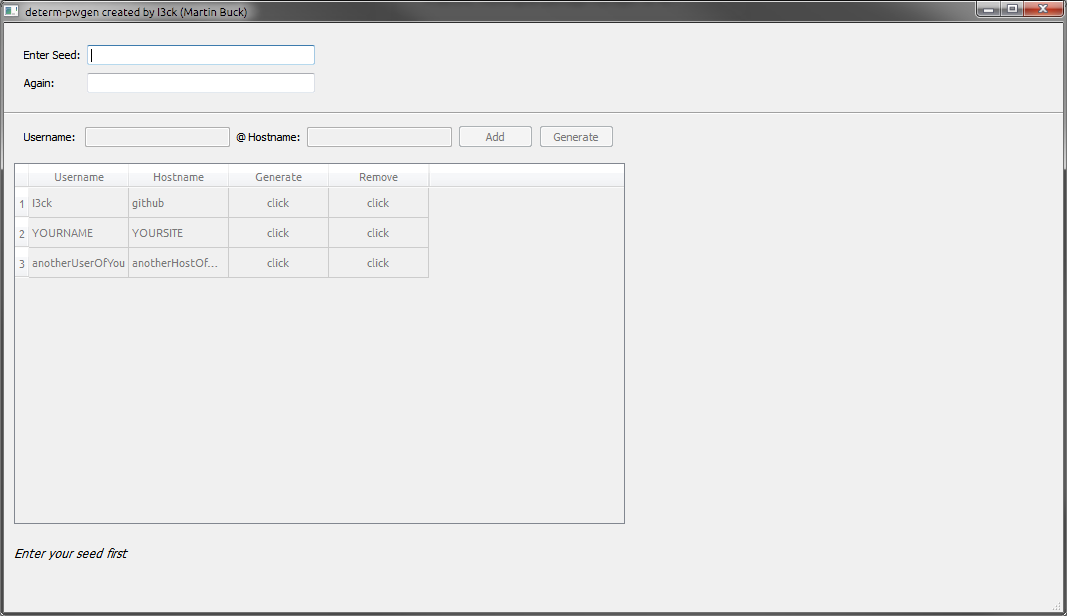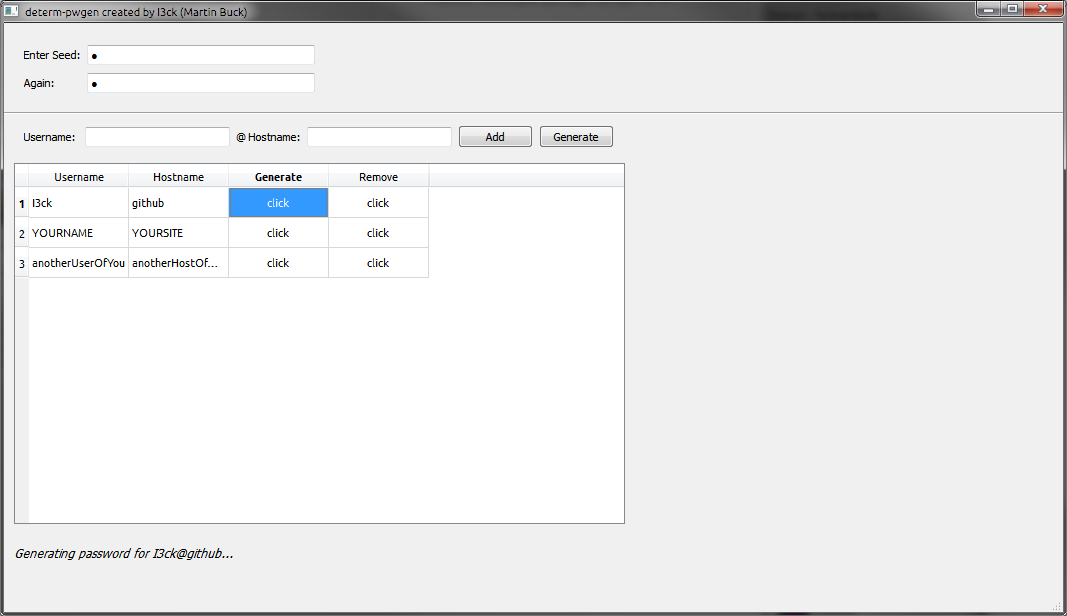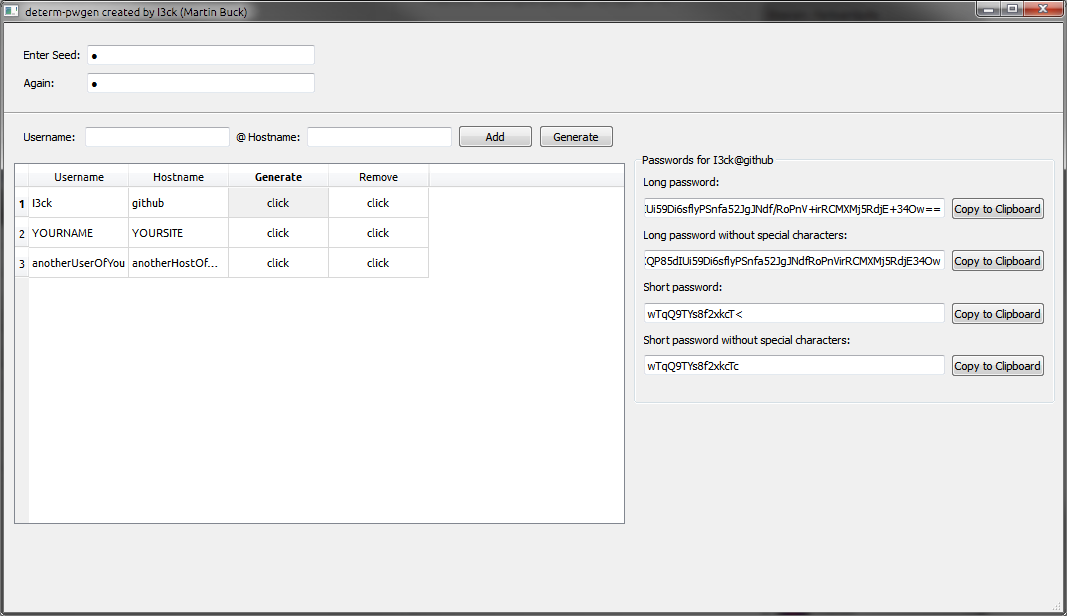A deterministic password generator for Python3.4
You'll only have to remember one password / seed and can use it to generate a unique password for many websites or programs
- generating DIFFERENT passwords than version 4 and prior (use version 4 to generate your old passwords and then change them https://github.com/I3ck/determ-pwgen/releases/tag/v4.0.2 )
- generating multiple password types (long, long without special characters, short, short without special characters)
- instead of solely using
sha256now using a combination ofmd5,sha1,sha224,sha256,sha384,sha512 - the password generation now uses about 100mb of memory by using a huge random salt for all hashing operations
- the reason for these changes was to not use
sha256solely because of Bitcoin mining ASICs. An attacker would have to build ASICs solely fordeterm-pwgen. The high memory usage makes this task even harder (seescrypt) - passwords are always mixed-case now
- passwords with special characters now always include at least one special character
- Ported to Python3
- In older versions, the hashes might have depended on your system. I got the same hashes on both Windows and Linux. So it's unlikely that there's a problem, but I suggest checking yourself. Version 4 and above now always generates the same hashes no matter the system.
- All passwords are compatible with version 3
- Now using Qt for the gui
- Generated passwords are now shorter, by using both lower- and uppercase characters (and different from version 1).
- Please use version 1 to recover the old passwords and move to version 2.
Enter your seed twice to enable the account table:
 After that, simply click onto the
After that, simply click onto the generate cells to generate a password for the desired account:
 Copy and paste your password to where it's needed:
Copy and paste your password to where it's needed:
 You can also add / remove accounts or generate a password directly, without adding them.
You can also add / remove accounts or generate a password directly, without adding them. accounts.json will be updated automatically.
No, I didn't use my seed there ;)
___________________________________________________________________
| determ-pwgen created by I3ck (Martin Buck) |
| https://github.com/I3ck/determ-pwgen |
| licensed under the MIT License (see LICENSE file) |
| use determ-pwgen-qt.pyw for a graphical user interface |
|___________________________________________________________________|
Enter your seed:
Seed:
Selection of usage mode:
Select usage mode:
[1] Input host- and username directly
[2] Use accounts.json
>
Mode 1 let's you directly input username and hostname to generate a password:
> 1
Enter the username and hostname you want to generate a password for:
Username: user
Hostname: host
--------------------------------------------------------------------------------
user @ host:
Long password:
gspTaZUAIEg9jytoZ1sfaRzd4sAe5qBdZT/PyRFLAmpesMwm4no1DbFHhKDRvFE9QejAtg3IS4+qC7NQIXlVCw==
Long password without special characters:
gspTaZUAIEg9jytoZ1sfaRzd4sAe5qBdZTPyRFLAmpesMwm4no1DbFHhKDRvFE9QejAtg3IS4qC7NQIXlVCw
Short password:
gspTaZUAIEg9jyt)
Short password without special characters:
gspTaZUAIEg9jyto
--------------------------------------------------------------------------------
Mode 2 allows you to generate passwords from your accounts.json file:
> 2
Edit accounts.json to add or remove accounts
[ 0] I3ck@github
[ 1] anotherUserOfYou@anotherHostOfYou
Type the number of the account you want to generate the password for
(-1 to abort)
> 0
--------------------------------------------------------------------------------
I3ck @ github:
Long password:
dYW6UQtHK/QcjVmSSiJQ102uIeNdnJMSZozBq0LV0jLoKBH4wjdj1UfkTZG05+vPbKLY1NHa3NVEaHHV
1VsG7w==
Long password without special characters:
dYW6UQtHKQcjVmSSiJQ102uIeNdnJMSZozBq0LV0jLoKBH4wjdj1UfkTZG05vPbKLY1NHa3NVEaHHV1V
sG7w
Short password:
dYW6UQtHK/QcjVmS
Short password without special characters:
dYW6UQtHKQcjVmSS
--------------------------------------------------------------------------------
The accounts.json is a simple json file:
[
{
"username": "I3ck",
"hostname": "github"
},
{
"username": "anotherUserOfYou",
"hostname": "anotherHostOfYou"
}
]
...which you can edit to add / remove accounts (or use the Qt GUI version)
To run the console version simply get Python 3.4 from https://www.python.org/downloads/ and run python determ-pwgen-console.py
To run the Qt-gui version you'll have to get PyQt4 for python3 from http://www.riverbankcomputing.co.uk/software/pyqt/download
and run python determ-pwgen-qt.pyw
or double-click the determ-pwgen-qt.pyw depending on your OS.
Either by using the same password for everything (easy to remember, very insecure)
Using a different password for every service (difficult to remember, very secure)
Instead of saving all your different passwords (like many password managers do),
determ-pwgen can generate any number of passwords, while you only have to remember a single password / seed.
Most password managers will save all your passwords in an encrypted database. This works perfectly fine, until you want to backup the database onto another device. (in case your hard drive fails) Whenever a password is added to your local copy, you have to ensure that all backups are being updated. This process is cumbersome, and, if not done correctly, may result in loss of many of your passwords.
determ-pwgem uses a hashing function to generate your passwords even the smallest change within the input of a hash function results in a totally different output:
sha256("This is your input")
=> 99ae620e26453eb71eaf55be65a337651e0e4f8eff85a8ea60b7196d8db422b9
sha256("this is your input")
=> 8d031674ce8b92785b8e9dc6fed81745982f98b342d4d65429f9be397d4f1132
Also it's impossible to reverse the function. By knowing the output, one can not calculate the input.
At the beginning the user provides the first part of the input. This is the "password" or "seed" that the user has to remember.
To generate a password, the user now simply provides the hostname and username.
determ-pwgen now generates a unique password for every hostname + username combination that the user provides
determ-pwgen now does something similar to:
hash(seed + hostname + username)
seed = "asuihdatzwgqe", hostname = "google", and username = "myName"
hash("asuihdatzwgqegooglemyName")
To demonstrate the changes when using another username, once again sha256 is used:
myName changed to myName2
sha256("asuihdatzwgqegooglemyName")
=> 0cdee0898a8f8ef25c0d18ea72da4d637953903dcaf1dcc5724aafdca07a4e88
sha256("asuihdatzwgqegooglemyName2")
=> a2e34c47bef2ee7d2a93ba9635f88d5dbbbb0eb1c77084602c926c6782cce3b5
That way the user only has to remember the seed and can generate any number of passwords from it if someone manages to steal the password of "myName", "myName2"'s password would still be save
#Donate Feeling generous? BTC: 19iBhPLkco15ap9HV5UUT5PNoU2djiUiz2